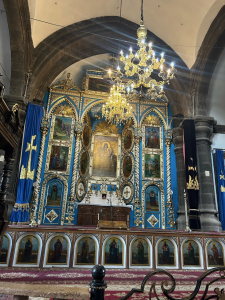Embarrassed? Don’t be…
Armodoxy for Today: Embarrassed? Don’t be…
Several years ago, my spiritual father, that is the bishop who ordained me, asked me to join him at an ecumenical gathering. I was a deacon at the time. Priests, ministers, preachers and lay leaders from different denominations get together in a spirit of ecumenism to celebrate their common faith in Jesus Christ. Wanting to learn more about the first Christians, the gathering had invited Archbishop Vatché to address the conference. As his deacon, they sat me next to him on the dais.
Now I should mention that Archbishop Vatché, of blessed memory (1930-2023), was a straight shooter, in other words, he spoke his mind. He was a presence in the room, and this room was filled with ministers and pastors from all the major Protestant denominations. After they introduce him, he stood behind the podium, with his black cassock, episcopal medallion hanging from his neck, and Armenian monastic hood (velar) on his head. Did I mention he was a presence in the room?
He looked out at the audience of clergy and spoke into the microphone there was no doubt it was a direct message to everyone there. He said, “You!” (emphasized) “You have a lot to learn from us!” I slowly sank into my seat, hoping no one would notice my embarrassment. Here we were at a large gathering honoring the head of the Armenian Church, and here he is talking down to them. Time just stopped for that moment for me. And then, without losing his force in his voice he continued, “And we” (emphasized) “We have a lot to learn from you!” I straighten out in my seat and felt only embarrassed and disappointed in myself that I didn’t have the faith to know he was a man who understood the church well.
Archbishop Vatché’s comment came out of a place of love for the Holy Church. In the next few minutes, he outlined the strengths of the Orthodox Church, the Catholic Church and the Protestant denominations. He spoke about life in a world where so many factors influence and affect families and people and stand in the way of peace. And he pointed to the Answer, Jesus Christ, that is the common bond between all those in attendance. He left the crowd on their feet in a standing ovation.
In the oldest Gospel, Mark writes a short narrative describing an encounter between the disciple of Jesus and a group outside of the Disciples. Now John answered Him, saying, “Teacher, we saw someone who does not follow us casting out demons in Your name, and we forbade him because he does not follow us.”
But Jesus said, “Do not forbid him, for no one who works a miracle in My name can soon afterward speak evil of Me. For he who is not against us is on our side. For whoever gives you a cup of water to drink in My name, because you belong to Christ, assuredly, I say to you, he will by no means lose his reward. (Mark 9:38-41)
In a world that is full of hatred, disease, inhumanity, and corruption, the Christian message of love supersedes all else as the solution and it begins with Christians displaying that respect and love toward one another.
Let swords be turned into ploughshares, fear to trust, despair to hope, oppression to freedom, starvation to prosperity, occupation to liberation, and peace and justice could be experienced by all. (Prayer for Christian Unity, WCC)



